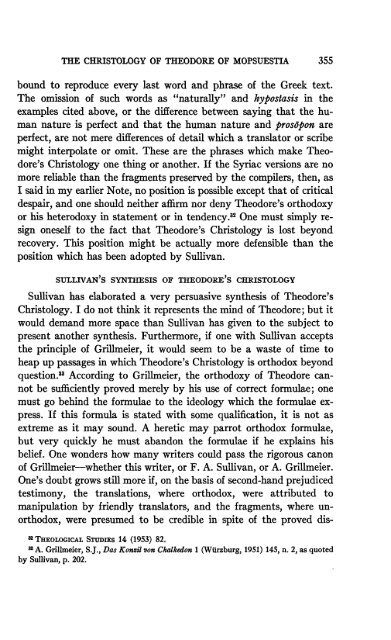ANNOTATIONS ON THE CHRISTOLOGY OF THEODORE OF ...
ANNOTATIONS ON THE CHRISTOLOGY OF THEODORE OF ...
ANNOTATIONS ON THE CHRISTOLOGY OF THEODORE OF ...
Create successful ePaper yourself
Turn your PDF publications into a flip-book with our unique Google optimized e-Paper software.
<strong>THE</strong> <strong>CHRISTOLOGY</strong> <strong>OF</strong> <strong>THE</strong>ODORE <strong>OF</strong> MOPSUESTIA 355<br />
bound to reproduce every last word and phrase of the Greek text.<br />
The omission of such words as "naturally" and hypostasis in the<br />
examples cited above, or the difference between saying that the human<br />
nature is perfect and that the human nature and prosopon are<br />
perfect, are not mere differences of detail which a translator or scribe<br />
might interpolate or omit. These are the phrases which make Theodore's<br />
Christology one thing or another. If the Syriac versions are no<br />
more reliable than the fragments preserved by the compilers, then, as<br />
I said in my earlier Note, no position is possible except that of critical<br />
despair, and one should neither affirm nor deny Theodore's orthodoxy<br />
or his heterodoxy in statement or in tendency. 32 One must simply resign<br />
oneself to the fact that Theodore's Christology is lost beyond<br />
recovery. This position might be actually more defensible than the<br />
position which has been adopted by Sullivan.<br />
SULLIVAN'S SYN<strong>THE</strong>SIS <strong>OF</strong> <strong>THE</strong>ODORE'S <strong>CHRISTOLOGY</strong><br />
Sullivan has elaborated a very persuasive synthesis of Theodore's<br />
Christology. I do not think it represents the mind of Theodore; but it<br />
would demand more space than Sullivan has given to the subject to<br />
present another synthesis. Furthermore, if one with Sullivan accepts<br />
the principle of Grillmeier, it would seem to be a waste of time to<br />
heap up passages in which Theodore's Christology is orthodox beyond<br />
question. 33 According to Grillmeier, the orthodoxy of Theodore cannot<br />
be sufficiently proved merely by his use of correct formulae; one<br />
must go behind the formulae to the ideology which the formulae express.<br />
If this formula is stated with some qualification, it is not as<br />
extreme as it may sound. A heretic may parrot orthodox formulae,<br />
but very quickly he must abandon the formulae if he explains his<br />
belief. One wonders how many writers could pass the rigorous canon<br />
of Grillmeier—whether this writer, or F. A. Sullivan, or A. Grillmeier.<br />
One's doubt grows still more if, on the basis of second-hand prejudiced<br />
testimony, the translations, where orthodox, were attributed to<br />
manipulation by friendly translators, and the fragments, where unorthodox,<br />
were presumed to be credible in spite of the proved dis-<br />
32 <strong>THE</strong>OLOGICAL STUDIES H (1953) 82.<br />
33 A. Grillmeier, S.J., Das Konzil von Chalkedon 1 (Wiirzburg, 1951) 145, n. 2, as quoted<br />
by Sullivan, p. 202.
















